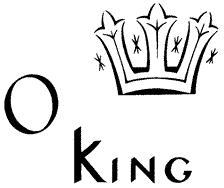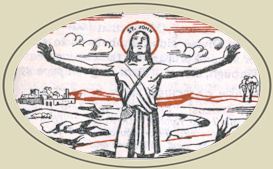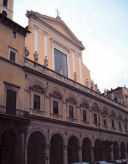» Enjoy our Liturgical Seasons series of e-books!
"A certain nobleman went into a far country to receive for himself a kingdom and to return" (Luke 19:12). This nobleman is Christ, the Son of God, King of all nations. His kingdom is over all men and over all things, both material and spiritual. He has everything in His hand as God and man. But another, Satan, has broken into His kingdom and has made himself master of many of Christ's subjects. In the old dispensation only a small part of humanity, the chosen people, remained faithful to the almighty King.
Christ, the Son of God, came into this "far country" in order to become man and, by means of humility, obedience, and poverty, to cast out the usurper who had taken His subjects. He came to reassert His dominion over all those who had left Him, both Jews and Gentiles.
According to the 1962 Missal of Bl. John XXIII the Extraordinary Form of the Roman Rite, today, in some places, is the feast of St. Frances Xavier Cabrini, Founder of the Missionary Sisters of the Sacred Heart. Her feast is celebrated on November 13 in the Ordinary Rite.
O Antiphons ~ King of the Gentiles
Click here for commentary on the readings in the Extraordinary Form of the Roman Rite.
The Fourth Sunday of Advent
‘The Lord himself will give you this sign: the virgin shall conceive, and bear a son, and shall name him Emmanuel’ (Is 7:14). This well known affirmation by the prophet Isaiah announces the coming of the Messiah into human history. It already gives us a taste of the proximity of that marvelous, stupendous day which will be the ‘dies natalis’ of Jesus. It was foretold by the prophets and proclaimed throughout the whole of Sacred Scriptures that He would be the One who would fulfil and bring them to completion. Our God will be incarnated and born due to the generous willingness of the ‘Virgin’ who, from the very beginning of time, was chosen to be the Mother of the Savior.
On the one hand we see Ahaz’s weak faith as he declined God’s concession to grant him a sign. Whilst on the other hand we see God’s insistence in giving a sign so that His dwelling place amongst men could be fully realized (cf Is 7:10-14).
‘Joseph, son of David, do not be afraid to take Mary as your wife’ (Mt 1:20). Just like in the reading from the prophet Isaiah, yet in a diametrically opposed way to Ahaz’s incredulous attitude, we see Joseph’s full adherence to God’s will. He had just decided to divorce Mary on account of her unexpected pregnancy in accordance with the Law, but upon the Angel’s reassurance ‘he did what he told him to do: he took his wife home’ (Mt 1:24). Joseph’s need for reassurance that the child was the fruit of the Holy Spirit doesn’t diminish his fatherhood but rather enhances it as ‘You must name him Jesus, because He is the One who is to save His people from their sins’ (Mt 1:21). In other words, thanks to his extraordinary fatherhood he, himself accepted and permitted the realization of God’s promise to reside amongst His people. Joseph’s great faith helps us to comprehend that faith assumes a new importance in the most intimate things that belong to us. We are reminded today that everyone of us has received our ‘apostolic mission’ to ‘obtain the obedience of faith’, and to profess our faith in Jesus Christ (cf Rm 1:1-7).
In all of these events we see the great mission that Mary undertook as a privileged instrument in the hands of God. It is thanks to her that God found His home amongst men, as she became that first resting place of the Word: ‘Today O Mary you became the book in which our rule is described. In you today is written the wisdom of the Eternal Father…. O Mary, my sweetest love, in you is written the Word, from whom we have life’s doctrine. You are the table on which that doctrine rests. I see this Word that is written in you, who is not without the holy desire of the cross. Immediately that he was delivered to you, the desire of dying for the health of men, for whom he was incarnated, was grafted and placed in Him.’1
Wake up, therefore, because the birth of the Lord is almost at hand, let us go to meet Him in His glory: to listen to him, to love Him and to follow Him!
1 St. Catherine of Siena, Prayers and Elevations
From the Congregation for the Clergy
![]()
O King of the Gentiles
"Come and save man, whom Thou hast made out of dust." What is man? He is but a particle of dust, an insignificant creature who has further separated himself from God through sin. He has been cut off from the fountain of truth and banished from God to darkness and misery. Still in the ruins there dwells a spirit that possesses a capacity for truth. In these ashes there is yet a spark that may be fanned to life to burn with the brilliance of divine life. But only God can revive this flame. For this reason the Church cries out, "Come and save man, whom Thou hast made out of dust." Save him who is so weak, so miserable and helpless. Remember his nothingness. Consider the many enemies who lay snares to rob him of divine life and to entice him into sin. Think of his obscured knowledge and his proneness to evil, of his tendency to error, and his weakness in the face of temptation. Guard him from the enticements of the world; shelter him from the poison of erroneous teaching; deliver him from the devil and his angels.
During these days before Christmas, the Church contemplates the overwhelming misery of unregenerated mankind. She cries out, "Come and save man, whom Thou hast made out of dust."
Jesus is King of all nations. "The kings of the earth stood up and the princes met together against the Lord and against His Christ. Let us break their bonds asunder, and let us cast away their yoke from us. He that dwelleth in heaven shall laugh at them, and the Lord shall deride them. Then shall He speak to them in His anger and trouble them in His rage. But I am appointed king by Him over Sion, His holy mountain. ... The Lord hath said to Me; Thou art My Son; this day have I begotten Thee. Ask of Me and I will give Thee the Gentiles for Thy inheritance, and the utmost parts of the earth for Thy possession" (Ps. 2:2-8). Well may Herod seek the life of the newborn king. Indeed, many kings and tribes and nations in the course of time shall deprecate the divine King, Christ. But to Him has been given all power in heaven and on earth (Matt. 28: i8). Before Him every knee shall bend, and every tongue shall confess that He is the Lord (Phil. 2:10f.).
The more the mighty condemn the kingship of Christ, the more shall He be exalted by the Father.
Now He comes to us in the form of a lovely child. One day in the presence of the Roman governor He will assert His right to kingship. But after this one public confession of His royal origin He withdraws again into the obscurity which He had freely chosen. For the present He is satisfied with this manifestation of His royal dignity. The day will come, however, when He will manifest it with power and majesty as He comes again on the clouds of heaven. Before all nations God will declare: "I have anointed Him King of Sion. My holy mountain." All men shall pay Him homage as king; all nations shall acclaim Him the King of Glory.
Excerpted from The Light of the World by Benedict Baur, O.S.B.
![]()

6th O Antiphon:
O King of the Gentiles and their desired One,
Cornerstone,
Who makest two into one,
COME
and deliver man,
whom You formed out of the dust of the earth.
![]() Today is Day Seven of the Christmas Novena.
Today is Day Seven of the Christmas Novena.
 Commentary for the Readings in the Extraordinary Form:
Commentary for the Readings in the Extraordinary Form:
Fourth Sunday of Advent
"John, the son of Zachary," to a world now awaiting its God, pleads for our final pre-Christmas "make ready." "Make ready the way of the Lord, make straight His paths" (Gospel).
Heroically, in the desert, he warns against the softness of life in the city, pictured in the background. Alive to the danger of a "soft garments" life, he is seen in a rough "garment of camel hair," carrying a baptismal shell, "preaching a baptism of repentance."
Excerpted from My Sunday Missal, Confraternity of the Precious Blood
Advent Reflection: The Light of a New Humanity
Anyone who goes through our streets in the early days of December will often meet him, Santa Claus, dressed more or less as a bishop and never without his long white beard (which has been attributed to him since at least the eighth century). What these Santa Claus figures say and do is also more or less episcopal in nature; often they are more in the role of the bogeyman than of one who makes present the love of the Holy One, that love of which the legend speaks in many variations. It is almost impossible to tell with historical precision who this man was; and yet, by listening attentively to the oldest sources, through the mists of time, we can still discern the radiance of a figure who opens up a door to Advent, who can mediate, that is, an to of Jesus Christ.
In his portrayal of the life of St. Nicholas, his most ancient biographer, a certain Archimandrite Michael, says that Nicholas received is dignity from Christ's own sublime nature just as the morning star receives its brilliance from the rising sun. Nicholas was a living imitation of Christ: "In the radiance of his virtues", says the biographer, "the sun's righteousness has dawned." Tradition has always equated Santa Claus with the Bishop Nicholas who participated in the Council of Nicaea and, together with that first great assembly of bishops, helped to formulate the affirmation of the true divinity of Jesus Christ. What was at stake here was the core of Christianity, whether Christianity was to become just another sect or something really new, faith in the Incarnation of God himself. Was Jesus of Nazareth only a great religious man, or had God himself actually become, in him, one of us? So, ultimately, the question was this: Is God so mighty that he can make himself small; is he so mighty that he can love us and really enter our lives? For if God is too far away from us to love us effectively, then human love too is only an empty promise. If God cannot love, how can man be expected to do so? In professing faith in God's Incarnation, therefore, it was ultimately a case of affirming also man's capacity to live and die in a human manner. The figure of St. Nicholas, Santa Claus, illustrates and symbolizes this connection.
Theodor Schnitzler put this very well: "In putting his signature, in faith, to the mysterium of the incarnate Son of God, a person is enabled to be a helper of his fellow men, to bring happiness to children, families and the oppressed. Faith in the Incarnation promotes the salvation of mankind and the implementation of human rights."
The oldest sources concerning St. Nicholas also point in the same direction from a different angle: Nicholas is one of the first people of to be venerated as a saint without having been a martyr. During the persecution of Christians, those who opposed the pagan state power and gave their lives for their faith had quite automatically become great examples of faith. When peace was concluded between Church and state, people needed new models. Nicholas impressed them as one ready to help others. His miracle was not that of great heroism in the face of torture, imprisonment and death. It was the miracle of constant kindness in everyday life.
Another of the legends expresses it very beautifully in this way: Whereas all the other miracles could be performed by magicians and demons, and thus were ambivalent, one miracle was absolutely transparent and could not involve any deception, namely, that of living out the faith in everyday life for an entire lifetime and maintaining charity. People in the fourth century experienced this miracle in the life of Nicholas, and all the miracle stories which accrued subsequently to the legend are only variations on this one, fundamental miracle, which Nicholas' contemporaries compared, with wonder and gratitude, to the morning star reflecting the radiance of the light of Christ. In this man they understood what faith in God's Incarnation means; in him the dogma of Nicaea had been translated into tangible terms.
The morning star which receives its light from the rising sun—this ancient description of St. Nicholas is also one of the oldest images of the meaning of Advent. If we are to be continually lighting candles of humanity, giving hope and joy to a dark world, we can only do so by lighting them from the light of God incarnate. This, at the deepest level, is the message of all Santa Claus figures: from the light of Christ we are to light the flame of a new humanity, caring for the persecuted, the poor, the little ones—this is the core of the legend of St. Nicholas.
—Joseph Cardinal Ratzinger, Seek That Which is Above

Fourth Sunday of Advent
Station with Ss. XII Apostoli or Santi Dodici Apostoli (Church of the Twelve Holy Apostles):
At Rome, the Station is in the Basilica of the Twelve Apostles, better known in Rome as better known as Santi Apostoli. We receive today a twelve-fold blessing from the apostles with whom we celebrate this last Sunday of Advent. As living stones we are built on these twelve solid and sacred foundation stones who themselves rest on the divine cornerstone, Christ. Ye holy apostles of Christ, be with us and pray for us, that with well-prepared hearts we may "go forth to meet Him, and say: Great is His dominion, and His kingdom will have no end; He is God, the Mighty, the Ruler, the Prince of Peace."
For more on Santi Dodici Apostoli, see:
For further information on the Station Churches, see The Stational Church.






